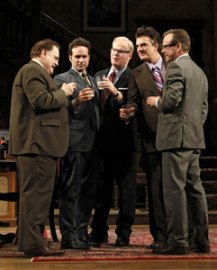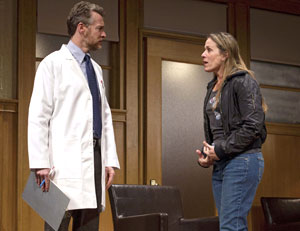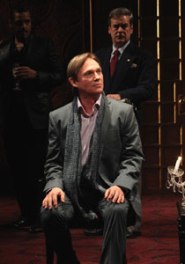Category: "Review"
Review: Cactus Flower
Mar 14th

If you’re going to revive an old-fashioned chestnut of a romantic comedy like Abe Burrows’ Cactus Flower, the least you can do is deliver a staging with some sparks. They are sadly lacking in the Off-Broadway revival currently on view at the Westside Theatre, which resembles a summer stock production, only without the usual B-level stars.
Instead, the producers have cast the decidedly unfunny Maxwell Caulfield in the lead role of Julian, the womanizing middle-aged dentist who pretends to be married in order to keep his younger girlfriend’s romantic aspirations at bay. The cast also includes soap opera veteran Lois Robbins as the motherly receptionist who harbors a not-so-secret yen for her boss and young Jenni Barber as the frustrated girlfriend. Suffice it to say that none of them manages to erase the memories of Walter Matthau, Ingrid Bergman and the Oscar-winning Goldie Hawn in the 1969 film version, which itself was no classic.
Burrows adapted his play from a vintage French comedy by Pierre Barillet and Jean-Pierre Gredy. The storyline has indeed proved durable, as it also served as the basis for the recent Adam Sandler/Jennifer Aniston film Just Go With It.
With snappy direction and inspired performers, the play might still prove diverting fun, especially for the matinee lady crowd. But director Michael Bush’s leaden production produces nary a single laugh over the course of its overlong two-and-a-half hours.
Caulfield displays no comic chops whatsoever—he can’t even pull off the called-for double take when Julian spots his receptionist sporting the mink stole that he had given to his girlfriend. Robbins is suitably stuffy in the play’s first half, but is less convincing when required to convey her character’s transformation into giddy sexuality. And Barber, while appealing, is so similar in looks and style to Hawn that the results are merely distracting.
Add to that a supporting cast who ham it unmercifully in the smaller roles and an awkward, heavily wood-paneled set that fails to suggest the required multiple locations. The results feel like cheap champagne that has long lost its fizz.
Westside Theatre, 407 W. 43rd St. 212-239-6200. www.Telecharge.com
Review: That Championship Season
Mar 7th

After two movie adaptations and an Off-Broadway production a decade ago, there would seem to be no compelling reason to revive Jason Miller’s That Championship Season. But, ah yes, there is, as this old-fashioned drama provides a perfect opportunity for the sort of limited engagement star casting that has become a winning recipe for Broadway success.
The good news is that the star-studded ensemble does very well by their by now familiar characters. The bad news is that this 1972 Tony and Pulitzer Prize-winning drama--about the reunion of former high school basketball players celebrating the 20th anniversary of their biggest victory-- hasn’t aged particularly well.
Gregory Mosher, who staged a revelatory revival of Arthur Miller’s A View From the Bridge last season, has failed to work similar magic here. But he has assembled a terrific cast that has already proven catnip at the box-office.
It includes Brian Cox as the coach who none too subtly reveals his racism; Jason Patric as the alcoholic Tom; Jim Gaffigan as George, the small-town mayor struggling for re-election; Chris Noth as Phil, the successful businessman whose support George desperately needs; and Kiefer Sutherland as James, the frustrated junior high principal who hopes to improve his lot in life by successfully managing George’s campaign.
The play follows a fairly predictable template. As the evening wears on and the characters become increasingly drunk, secrets and betrayals rise to the surface, with dramatic revelations and violent confrontations arriving on a fairly constant basis.
Nearly forty years after its premiere, it feels stodgy and predictable now. But the play still works to some degree, thanks to its frequent doses of acerbic humor and effective tapping into the classic theme of dashed hopes.
It comes as no surprise that theater veteran Cox walks away with the evening with his forceful performance as the coach. On the other hand, who would have guessed that Patric (the playwright’s son, by the way) would display such formidable comic chops with his consistently funny turn, especially after his disappointing work as the similarly boozy Brick in the ill-fated Broadway revival of Cat on a Hot Tin Roof.
Also fine are Gaffigan, perfectly cast as the uncharismatic mayor, and Chris Noth, in familiar territory as the slick and sleazy businessman. Sutherland is less convincing as the milquetoast James, but one has to admire the actor’s desire to play against type and meld into the ensemble rather than exploit the macho persona he honed to perfection over so many seasons of 24.
But all the actors’ efforts are not enough to overcome the mechanistic nature of the play itself, which has entered middle-age no more gracefully than its misbegotten characters.
Bernard B. Jacobs Theatre, 242 W. 45th St. 212-239-6200. www.Telecharge.com.
Review: Good People
Mar 4th

Playwright David Lindsay-Abaire, who won the Tony and Pulitzer for Rabbit Hole, has expertly tapped into the zeitgeist with his newest work, Good People. This hard-edged comedy about class differences is bound to strike a chord in a modern economic climate that is resulting in an ever growing disparity between the haves and the have-nots.
Set in South Boston, the play primarily concerns the charged interactions between Margie (Oscar winner Frances McDormand), who has just been let go from her job as a cashier in a dollar store, and Mike (Tate Donovan), the old flame turned prosperous physician who she turns to for help.
Single mom Margie has lost her job due to the constant tardiness caused by her having to care for her mentally impaired young daughter. Desperately concerned about her ability to make ends meet, she eagerly grasps at her old friend Jean’s (Becky Ann Baker) suggestion to look up “Dr. Mike” and ask him for a job.
But when she shows up at his well-appointed office, it quickly becomes apparent that Mike, although sympathetic to his old high school flame’s plight, has little interest in helping. He does, however, throw her a bone in the form on an invitation to the birthday party he and his significantly younger, African-American wife Kate (Renee Elise Goldsberry) are throwing for their young daughter.
Shortly before the event, he calls to cancel, explaining that the birthday girl is sick. But Margie, suspecting that he’s merely had second thoughts about inviting her, decides to attend anyway.
When she shows up unexpectedly at his upscale neighborhood home with a gift of a tacky rabbit doll crafted by her eccentric landlady (Estelle Parsons), Margie discovers that he was telling the truth. The resulting confrontation between her and the couple, who are obviously experiencing marital difficulties, sharply exposes the different paths that their lives have taken.
Although not a major work, the play succeeds because of its incisively drawn characters and sharp, witty dialogue. The interactions between the characters feel vividly real, from Mike’s increasing registers of annoyance to Margie’s edgy sarcasm to Kate’s genuine attempts at civility. Even Steve (Patrick Carroll), the dollar shop manager who fires Margie, is revealed to have unexpected depths in the bingo playing scenes that amusingly riff on the lower class characters’ financial desperation.
Under the pitch-perfect direction of Daniel Sullivan, the cast delivers superb performances. It’s no surprise that the ever reliable McDormand is excellent, but here she delivers a multi-faceted portrayal, complete with a perfect Southie accent, that rivals her Oscar winning turn in Fargo. She’s well matched by Donovan, who subtly but expertly conveys Mike’s barely disguised contempt; Goldsberry, suggesting hidden depths in the sympathetic Kate, and the rest of the ensemble.
Adding to the production’s effect are John Lee Beatty’s beautifully crafted sets, which vividly convey the characters’ wildly different financial circumstances.
Samuel J. Friedman Theatre, 261 W. 47th St. 212-239-6200. www.telecharge.com.
Review: Beautiful Burnout
Mar 3rd

If the new theater piece Beautiful Burnout is any indication, the Scottish theater company Frantic Assembly is aptly named. This work by Bryony Lavery (Frozen) set in a boxing gym is a whirlwind-paced portrait of young pugilists training and sparring. Superbly staged and choreographed, it’s fascinating to look at. But it offers little in the way of meaningful drama to complement its striking movement.
A co-production with the National Theatre of Scotland, it’s directed and choreographed by Scott Graham and Steven Hoggett. The latter also served as choreographer for Black Watch, the equally kinetic but far more substantial piece that was presented to great acclaim at St. Ann’s Warehouse a few seasons back.
For this production, the audience sits on three sides of the stage outfitted as a boxing ring. Through a fast-paced series of short scenes and monologues, we are introduced to the characters, including Bobby Burgess (Ewan Stewart), the hard-driving, tough-talking trainer; the three young male hopefuls under his tutelage (Taqi Nazeer, Eddie Kay, Henry Pettigew); the female boxer (Vicki Manderson) who is no less fierce than her male counterparts; and one of the boxer’s mother (Blythe Duff), who offers acerbic commentary throughout.
The sketchy narrative and characters seem mere afterthoughts to the staging, which offers a plethora of intricately choreographed training and fighting sequences, all scored to throbbing techno music by the band Underworld. The sensory assault is further amplified by an array of striking images projected on video monitors.
Although the fierce commitment and physical prowess demonstrated by the performers is highly impressive, it’s not enough to prevent the proceedings from becoming tedious. Beautiful Burnout thankfully avoids most of the clichés endemic to so many boxing dramas, but it also offers little to make us care about its would-be warriors.
St. Ann’s Warehouse, 38 Water St., Brooklyn. 718-254-8779. www.stannswarehouse.org.
Review: Timon of Athens
Mar 2nd

It’s easy to see why the Public Theater has chosen William Shakespeare’s--and possibly Thomas Middleton’s, according to some scholars--Timon of Athens as the inaugural productions of its Public LAB SHAKESPEARE series. This rarely performed drama, one of the lesser entries in the Bard’s canon, has definitely taken on a new resonance in these financially troubled times.
Richard Thomas delivers an impressive performance in the title role of an Athenian nobleman who recklessly showers his friends and associates with money and other forms of largesse. When his financial fortunes change, he’s quickly abandoned by nearly everyone in his orbit. In the second act, he has been reduced to a misanthropic, ranting hermit sequestered in a cave.
Director Barry Edelstein’s decidedly irreverent production delivers an almost satirical take on the play. Set in the vaguely contemporary present with its characters wearing tacky, ‘70s era costumes, it depicts a greedy society whose members are besotted by indulgence and excess.
When Timon hosts a dinner party, his guests are served with a bowl of caviar so huge that it rivals Al Pacino’s gargantuan stash of cocaine in Scarface. As entertainment, he presents a screening of the film It’s a Wonderful Life, reciting one of its most famous lines, “No man is a failure who has friends” before the screen changes to reveal a scene from a vintage stag film. As a visual indicator of the fragile state of Timon’s finances, fallen chandeliers litter the floor. And key emotional moments are signaled by the wailings of an electric guitar.
These gimmicky aspects tend to work against the simple power of the play, which despite its lack of complexity nonetheless exerts a certain fascination. Fortunately, the acting makes up for it. Thomas, an inspired choice, is so inherently likeable a performer that Timon’s frantic eagerness to please seems utterly natural, while his descent into bitter, raging madness is all the more powerful.
He receives excellent support from the leading members of the ensemble, including Mark Nelson as Timon’s loyal steward; Max Casella as a cynical philosopher; and Reg E. Cathey as a rebellious military officer. Unfortunately, many of the smaller supporting roles are played as jokey caricatures that are not nearly as amusing as intended.
Credit must go to the Public for presenting this little seen play, especially considering that tickets can be had for the bargain price of only $15. Better act fast, though—the production runs only through this Sunday.
Public Theater, 425 Lafayette St. 212-967-7555. Through Mar. 6. www.publictheater.org